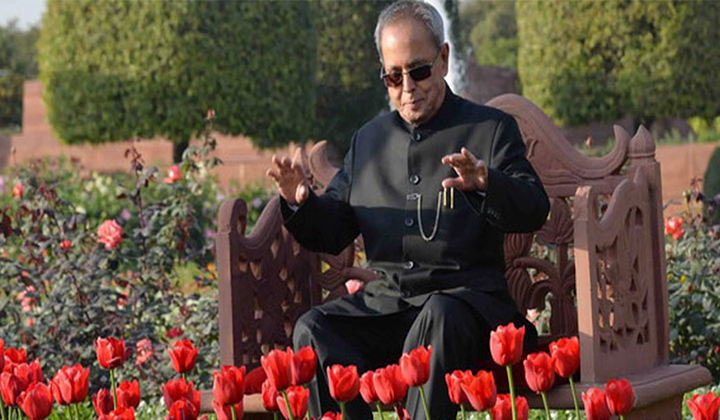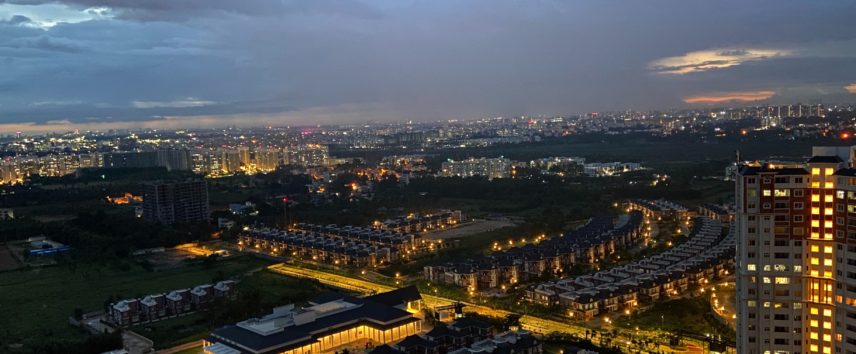Trending Now
- IPL 2024 begins with a bang. First contest between CSK and RCB.
- Election commission allots mike symbol to Naam Thamizhar Katchi
- AIADMK promises to urge for AIIMS in Coimbatore, in its election manifesto.
- Ponmudi becomes higher education minister.
Columns
Mr President, how about a lottery for common people to stay overnight at Rashtrapati Bhavan?
![]() August 3, 2016
August 3, 2016
It is always a fine idea to nurture those who are creative, innovative and inspired. It is finer still to have as their nurturer the President of India. Pranab Mukherjee therefore deserves to be applauded for having initiated an In-Residence programme, which has seen a clutch of artists, writers, “innovation scholars” and “inspired teachers” to stay, for varying lengths of time, in the resplendent quarters of Rashtrapati Bhavan.
At the last count, 141 of them have been hosted by Rashtrapati Bhavan. Lucky them!
The most recent In-Residence guests of the President were reputed novelist Amitav Ghosh and his wife, Deborah Baker, an accomplished biographer and essayist. During their five-day stay at Rashtrapati Bhavan, Ghosh tweeted pictures of the dining table where the great leader Nelson Mandela had breakfast, the regal bedroom in which the writing duo stayed, and the impressively groomed horses in the President’s stable. Ah, you could almost hear them neigh!
Those photographs mesmerised us all, but also had a few of us sigh and ask silently: Mr President, Sir, will the living quarters of Rashtrapati Bhavan ever host us common citizens?
Some are more equal…
At this question, you are likely to wonder whether the talented are special citizens. Oh, yes, they do indeed constitute a category of their own – it is their specialness which had them apply for the In-Residence programme and a committee of experts to vet and clear their names for a stay at Rashtrapati Bhavan, all expenses paid.
By contrast, common citizens are those whose commonness condemns them to a life of anonymity. They are unsung, forever caught in a struggle to overcome their mediocrity. It is they who constitute the masses. They are those who merge into the sameness of crowds. Nobody knows them other than people in their villages, neighbours in urban residential colonies, colleagues in offices, and the few with whom they studied or are friends with.
Yet a nation, more so a democratic one, has them as its pivot. Do not think poverty is the trait common to all who constitute the amorphous mass of people. What binds them is their sheer ordinariness, people like you and me, for whom living with a smile would seem creative enough.
It is we, the ordinary, who will never be housed in Rashtrapati Bhavan. And that’s an irony.
This is because, as the Rashtrapati Bhavan website grandly declares,
“The might and authority of the people of India, which pervades this Republic is represented by the President of the country, whose official residence is the Rashtrapati Bhavan… (Emphasis mine).”
The President represents us, the ordinary folks, which is why it hurts a wee bit that it won’t be our fate to stay in the stately Presidential Estate that sprawls over 320 acres. Not for us to arise in the morning to glimpse at its enchanting verdure in the early morning sunlight and to listen to birds twitter.
Rashtrapati Bhavan desperately requires us ordinary folks, if not for anything, but to shatter its exclusivity, which, notwithstanding Mukherjee’s efforts, is still daunting. Built to flaunt Imperial power and authority, to communicate to Indians the permanence of the British Empire, it is perhaps only the spirit of our ordinariness that can indigenise Rashtrapati Bhavan and overturn its architectural symbolism. Our living there, for even a day or two, will communicate to the world the power of people, the power of ordinariness.
Power of ordinariness
No doubt, it would be a gargantuan problem to choose from common citizens who should stay in Rashtrapati Bhavan. Our mediocrity precludes the possibility of laying out qualification criteria to sift people. Our sameness will ensure that lakhs and lakhs of applicants meet the minimum prescribed standard. Rashtrapati Bhavan cannot possibly accommodate them all.
This is why Rashtrapati Bhavan should evolve a lottery system, inviting people to buy a ticket, online or issued at designated ticket counters, for a price. Determine the number of visitors Rashtrapati Bhavan could host for an overnight stay every year. Draw lots on a given day and publish the list of lucky ones at the Rashtrapati Bhavan website, detailing who stays there on which date.
Obviously, the lottery ticket shouldn’t be priced high. Since it charges Rs 25 a person for a day tour of Rashtrapati Bhavan, it could also be the price of a lottery ticket. Or, better still, it could be sold at Rs 10, which is what you dish out for a railway platform ticket.
Call it People’s In-Residence Project. Advertise it and it is bound to elicit a massive response. The excitement it will generate will forge a close link between the people and Rashtrapati Bhavan. More significantly, the proceeds from the lottery could finance the People’s In-Residence Project.
The President, obviously, should have the discretion to invite whoever he thinks is worthy of it. For instance, he could ask Mandodari Nayak, wife of Raghunath Nayak, to spend time in Rashtrapati Bhavan. A gardener at Birla House in 1948, Raghunath chased and caught Nathuram Godse after he assassinated Mahatma Gandhi and tried to flee. The Odisha government recently announced an assistance of Rs 5 lakh to Mandodari, who languishes with her family in a remote village in the state.
Or the President could invite the daughters of MM Khan, the NDMC legal adviser who was allegedly killed because he refused to take bribe from a hotelier for a favour. Or Rashtrapati Bhavan could host families of soldiers and officers killed in firefights with militants. Or of activists who dared to fight for the poor and were murdered.
Ordinary folks all, whose extraordinariness doesn’t arise from their creativity but from a sense of what they consider as their duty. The President could as well use Rashtrapati Bhavan to humanise the relationship between people and the state.
Perhaps a good many chosen through the system of lottery, or beneficiaries of the discretionary quota, will find Rashtrapati Bhavan intimidating – its commodious rooms, for instance. It is possible they would be unfamiliar with the etiquette pertaining to meals served in courses and even use of western-style toilet. Some of them could prove irritatingly boisterous or alarmingly rustic for the regal protocol of Rashtrapati Bhavan, which, as we all know, was the Viceroy’s House under British rule.
But they will not become an eyesore to the President nor offend his sensibilities. It cannot be anyone’s case to insist that the guests stay in the quarters where the President resides or, for that matter, sleep in the chambers where the Viceroys did – and where visiting heads of state do now. It is another matter that to have ordinary folks spend their nights there would be a telling way to express the will of us ordinary folks.
They could be accommodated in any of the buildings dotting the 320-acre of Presidential Estate. Nobody will insist on dining with the President nor having a personal audience with him, busy as he keeps.
But in case the President does indeed decide to converse with common citizens, he cannot possibly hope to discuss the finer points of painting or the art of writing. Most of them perhaps will not even have a sense of history, not even of the Republic through which pervades their “might and authority”.
But rest assured, the President’s guests will not be boring. They could tell him about their trials and tribulations, their small dreams and petty aspirations. They could tell him why they love the Republic despite its ideals often having been betrayed, or about the crushing hardships they labour under – and, above all, how they struggle to overcome their drab plainness.
About the Taj Mahal, poet Sahir Ludhianvi wrote that the emperor who built it used his wealth to mock the love of the poor. Likewise, to read about the talented staying overnight at Rashtrapati Bhavan, we find our ordinariness such an obstacle, such a cross to bear.
Ajaz Ashraf is a journalist in Delhi. His novel, The Hour Before Dawn, has as its backdrop the demolition of the Babri Masjid.






















